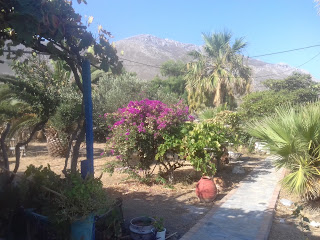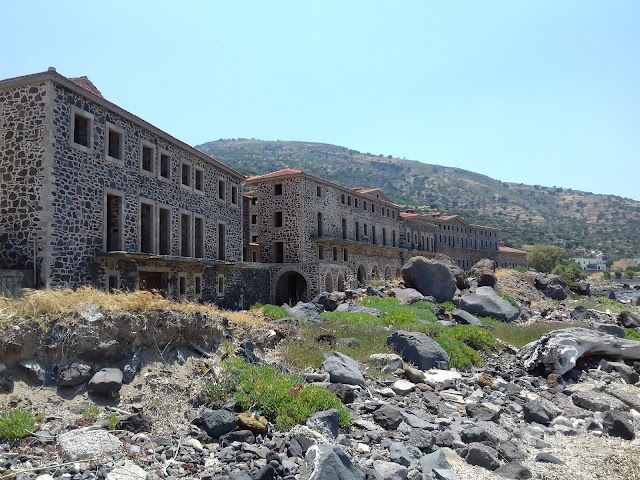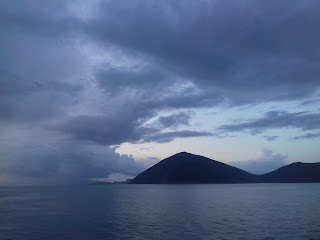Early in December, the days were a dose of pure tranquillity.
I worked until late in the evening, the wood burner with its
new chimney making the kitchen cosy. When I stepped outside before going to bed,
I noticed it wasn’t really cold, and stars shone brightly in the sky. It was
completely quiet.
Sometime after seven in the morning, my dog Lisa tiptoed
through to my bedroom to say hello. The cat, locked in the kitchen overnight as
it still couldn’t be trusted not to leap up and scratch or bite, started crying
for food. There was plenty of food in the house for them and for me too, apple
cake, fresh bread, a brick of feta and a cornucopia of vegetables, so no need
to go shopping. At lunchtime I had a long walk to Eristos with Lisa, meandering
in sunshine down tracks with the mellow greens of bushes and trees in every
direction. At the beach, a few other people were enjoying the balmy day, but so
distant I couldn’t even make out who they were; at this time of year, there are
no strangers. Most locals were in various stages of the olive harvest. On the
way back I waved to anyone I passed, and otherwise let my thoughts wander.
I worked late again, finishing off the edit of one book in preparation
for starting another. My work is editing books, often travel and adventure, and
I’d taken on more than usual since I’d have to stay at home rather than travel
to other islands as I like to do in winter. This year, I was very happy on my
little island, travelling through books. In the morning, the client hadn’t yet
sent the file I was due to start on, giving me a blessed excuse for a lazy
morning.
After coffee and emails, I went out into the sunshine in my
wellies to do some weeding of my vegetable patches and thin out some seedlings.
Maybe I’d get a few jobs done around the garden and enjoy the day. I noticed
the fishing boat that had been out at sea had now come into the harbour. A
little while later I heard a truck pass, and then reverse, and knew that a
moment later I’d hear Nikos the fisherman shouting, ‘Jennifer!’ while Lisa erupted
in a cacophony of barking. I bought a couple of kilos of fresh sardines. I’d
grill a few later in a little olive oil.
It wasn’t long after, around midday, when I heard a vehicle
approach from the other direction; I looked up and saw a flatbed truck loaded
with logs. A week or so earlier, I’d heard that Yorgos was offering good firewood,
and said I’d take a truckload. Yorgos, in his late fifties, usually lived on
Rhodes and worked in tourism, but given the lack of work this year he’d come to
Tilos and started taking care of his parents’ long-neglected land, which had
hundreds of trees, some very old. I was happy to see the field being worked and
the little house restored, and Yorgos was always very friendly. The firewood
would top up my supply and prepare me for January and February. I was therefore
delighted when Yorgos arrived with Kostas and the wood. They told me to open up
the gate so that Kostas could back his truck in. It wouldn’t open all the way because
of the palm tree, but I did my best.
I inherited several palms when I bought my house two years earlier,
and three of this shorter type, which grow to just over the height of a person,
originally stood by the gate. Because the house had been empty for five years,
they’d encroached onto the path and gate, causing some damage. I’d managed to
wrangle the smallest out of the ground, which had taken me several days of
battling half an hour at a time. The trunk of the largest one had assumed a
surreal shade of bright blue since Dinos spray-painted the gate. Because of the
blue palm, I didn’t think Kostas’ truck could get very far, but Yorgos gave
expert instructions and, with just a whisker of spare room on either side as I
held the gate, Kostas managed to back the truck into the garden.
Kostas has dark hair and eyes and a cheeky boyish smile that
lights up his face. Not that I would normally have noticed, of course, but he’s
quite alluring to watch when showing off his traditional dance skills at summer
festivals. An opportunity to help out his mate on a sunny day by making a
delivery to an appreciative female was probably too good to miss. And there I was
in dirty old clothes and wellies and probably mud on my nose or grass in my unbrushed
hair, more likely both. It was amusing as together we all threw logs and banter
here and there.
‘In the winter we work! In the summer we dance! Have I danced
with you yet? How’ve you escaped me? You’ve probably always got company…’
I retorted wryly that he was the one who always had plenty of
company. He grinned and then, ducking under the overhanging palm branches, changed
the subject.
‘That needs pruning,’ he said, and when I agreed, he whipped
out a saw from his truck and cut the palm branches back, nonchalantly sliding
the pruning saw into his back pocket afterwards. I thanked him and added,
smiling, that maybe he could cut down the whole tree. It probably needed to go
at some point.
‘You need a chainsaw for that. Stelios has got one. He’s got a
big one,’ he said, winking at Yorgos. He walked back to the truck, grabbed a
few heavy logs and added emphatically, ‘We work with our hands.’
The innuendo was being laid on with a trowel.
As they unloaded the last few logs, I went inside to get some
cash, but realised I didn’t have the right change. Neither did Yorgos, and
while both of us were happy to sort it out another time, Kostas suggested that instead
of change, they could bring me some more wood, another half-load. That sounded
a great idea.
‘We’ll be back!’ they said. They weren’t sure when. I continued
working in the garden and as the sun got warmer and I started on some messier
jobs, I changed into a paint-covered shirt and similarly paint-covered pair of
shorts. I was just thinking I’d call it a day and take Lisa for a walk when the
guys returned.
We opened the gate again and Kostas backed in. We continued
the unloading and the chat, and then as we were finishing up, Kostas looked at
the palm tree and said, ‘You’re right, that needs to go.’
At this point I started thinking, ‘Well, it doesn’t really... It
gives the house some privacy from the road. It needs to go one day, but not
yet.’
But of course, it was too late. Kostas grabbed a long rope
from his tuck and tied it around the trunk, and I was despatched to the road to
check for cars coming around the corner as the truck was put in gear. It pulled
the tree a little and then the wheels span. Again. And again. The tree was
rocking and the concrete driveway lifting slightly and I worried for the
gatepost.
‘Don’t scratch your head!’ mock-ordered Kostas, seeing me do
exactly that. ‘You see all the work we do for you?!’
‘Be careful of the gate, I need it…’ I said but my words were
lost.
‘Have you got another rope?’ asked Kostas. I fetched one that
had been rescued from the beach, and that was attached.
‘Again!’ shouted Yorgos as the wheels span. Then since the
tree roots were beginning to emerge from the ground, another strategy was
mooted by Kostas.
‘Stand on top of it! All together!’
Soon two grown men were standing on the trunk of a leaning palm
tree, now at 45 degrees but firmly hanging on as they rocked up and down,
hanging onto the top of the gate. I didn’t join them. I was quite worried about
my gate and gateposts, all essential for keeping Lisa safely in the garden
apart from the fact that they’d cost me a fair bit.
When Kostas asked for some kind of garden tool, I thought that
was an excellent idea, retreated to the apothiki and brought out various
– an axe, an old pickaxe and some other thing with a serious blade, which they
found very impressive. They set to whacking the roots with glee.
Then one of them thankfully realised we were wielding heavy-duty
blades with gay abandon within centimetres of the main water supply to the
house.
‘It’s OK, we’d better stop,’ I said, ‘let’s leave it for now.’
‘What, halfway?!!’ laughed Kostas with a determined look. Of
course. It was as if they were drinking whisky. This thing now had to run its
course.
I suggested it might be a good idea now to push the tree the
opposite way, but that idea was instantly dismissed. More pulling with the
rope, more standing on the palm tree, more bashing with implements…
‘It’s going! The tree’s going,’ said Kostas, grinning, ‘the
gate’s going, the driveway, the house…’
At that point Dimitris, friend and neighbour, drove by on his
way back from working at the doctor’s surgery and paused outside the gate. I
was laughing but my nervousness must have showed when I explained what was
happening, as no sooner had he disappeared than he was back to join the team. Despite
his more controlled, serious demeanour, the situation had by then reached such
a point of frenzy, a crazed level of violent activity that Lisa was barking and,
probably afraid, she bit him on the bottom.
Dimitris stepped in and assessed the situation, then calmly said
the tree needed to be pushed the opposite way now. Three, two, one… And it
worked.
For better or worse, the tree was down. The gate and the post
were still intact. Yorgos sat back, looking very red and dazed. Kostas was
barely able to speak. With bits of palm tree strewn all around, it looked as if
a hurricane had passed through. Which in a way it had.
Dimitris gradually walked back to his car. Then he called
over, and I heard him say something about the car window. It was stuck.
‘Have you got a screwdriver?’ shouted Kostas.






















































